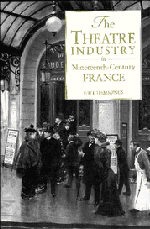Book contents
- Frontmatter
- Contents
- Chronology
- Introduction
- PART I THE AUDIENCES
- PART II THE ACTING PROFESSION
- 9 A pariah profession
- 10 Social origins
- 11 Training for the stage
- 12 Salaries and contracts
- 13 The difficult life of the actress
- 14 Acting standards
- PART III THE PROFESSION OF PLAYWRIGHT
- Notes
- Bibliography
- Guide to further reading
- Index
11 - Training for the stage
Published online by Cambridge University Press: 07 December 2009
- Frontmatter
- Contents
- Chronology
- Introduction
- PART I THE AUDIENCES
- PART II THE ACTING PROFESSION
- 9 A pariah profession
- 10 Social origins
- 11 Training for the stage
- 12 Salaries and contracts
- 13 The difficult life of the actress
- 14 Acting standards
- PART III THE PROFESSION OF PLAYWRIGHT
- Notes
- Bibliography
- Guide to further reading
- Index
Summary
In the French theatrical scene, nothing was so admired by foreigners as the institutional arrangements for securing an adequate supply of young actors to maintain past splendours and prove themselves adaptable enough to fill major parts in modern plays. Henry Irving had urged the foundation of a school for British actors on the model of the French one, but it was not until the year of his death (1905) that the idea bore fruit in the establishment at Gower Street of the Royal Academy of Dramatic Art. The Ecole Royale dramatique predated it by well over a century, having been founded in the last years of the ancien régime, though not until after several proposals and counter-proposals had been submitted, beginning with a memorandum drawn up by three leading members of the Comédie-Française, Lekain, Préville and Bellecour, in September 1756. It was urged by the signatories that the need for such a school had become acute since provincial companies were no longer able to supply the royal theatres in Paris with the new blood they required. The gap between acting standards in the provinces and the capital had been widening for some time, and when a trial was made in Paris of an actor enjoying a first-class reputation in the country, as likely as not the pit would shout him down after the first scene and call for an actor they were familiar with to replace him.
- Type
- Chapter
- Information
- The Theatre Industry in Nineteenth-Century France , pp. 172 - 182Publisher: Cambridge University PressPrint publication year: 1993



